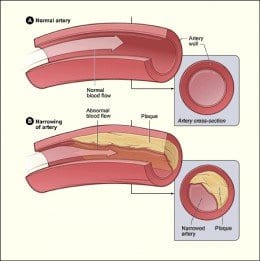
According to new research obtained by St. Louis’s Washington University School of Medicine, vitamin D can be helpful in unclogging arteries, which causes heart disease, in patients with diabetes.
Researchers report that blood vessels are less likely to clog in patients that have an adequate amount of vitamin D in their body. In patients that have little vitamin D in their body, the immune cells that are near and around the heart become trapped with cholesterol, which will in turn block those blood vessels , causing clogged arteries, heart disease and numerous other heart problems. Vitamin D deficiency is responsible for a lot of health problems.
Principal investigator Carlos Bernal-Mizrachi, M.D. stated, “About 26 million Americans now have type 2 diabetes and as obesity rates rise, we expect even more people will develop diabetes. Those patients are more likely to experience heart problems due to an increase in vascular inflammation, so we have been investigating why this occurs.”
Assistant professor of medicine and of cell biology and physiology, Bernal-Mizrachi and colleagues has found that vitamin D plays a big role in a healthy heart; it helps to keep heart disease at bay.
In the body, when vitamin D is low, a certain class of white blood cells are more likely to stick to the walls of blood vessels. Vitamin D conspires with macrophages (immune cells) to help clear arteries. The macrophages start as white blood cells that are referred to as monocytes. They circulate in the blood stream and clear out inflammation until they are turned into macrophages and they no longer circulate.
Forty-three people with type 2 diabetes and twenty-five without were looked at in a new study that showed vitamin D levels, body weight and gender were not a defining aspect in the study.
Within the study, is was seen that in patients that had diabetes and were low in vitamin D, that the macrophage cells were more likely to stick to the walls of the blood vessels, triggering higher cholesterol levels, stiffening blood vessels and blocking blood flow.
Instructor in Medicine, Amy E. Riek, M.D. stated, “We took everything into account. We looked at blood pressure, cholesterol, diabetes control, body weight and race. But only vitamin D levels correlated to whether these cells stuck to the blood vessel wall.”
Both Bernal-Mizrachi and Riek have not stated whether or not giving vitamin D to people with diabetes reversed their rick in developing clogged arteries. However, mice are now being treated with vitamin D to test that theory.
Bernal-Mizrachi explains, “In the future, we hope to generate medications, potentially even vitamin D itself, that help prevent the deposit of cholesterol in the blood vessels. Previous studies have linked vitamin D deficiency in these patients to increases in cardiovascular disease and in mortality. Other work has suggested that vitamin D may improve insulin release from the pancreas and insulin sensitivity. Our ultimate goal is to intervene in people with diabetes and to see whether vitamin D might decrease inflammation, reduce blood pressure and lessen the likelihood that they will develop atherosclerosis or other vascular complications.”